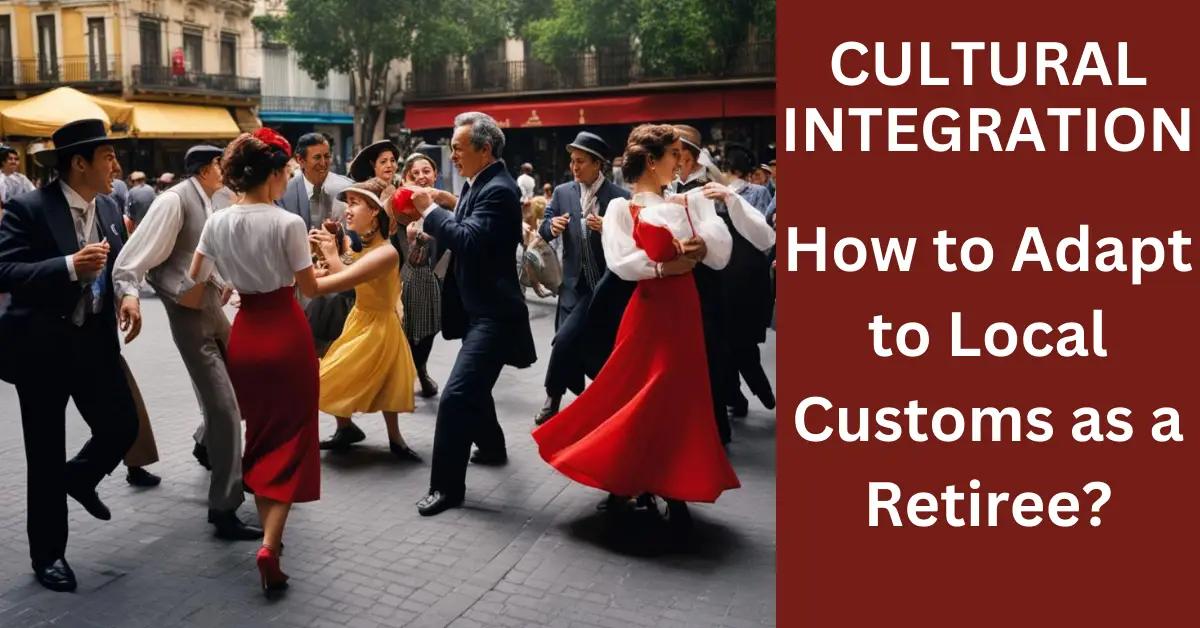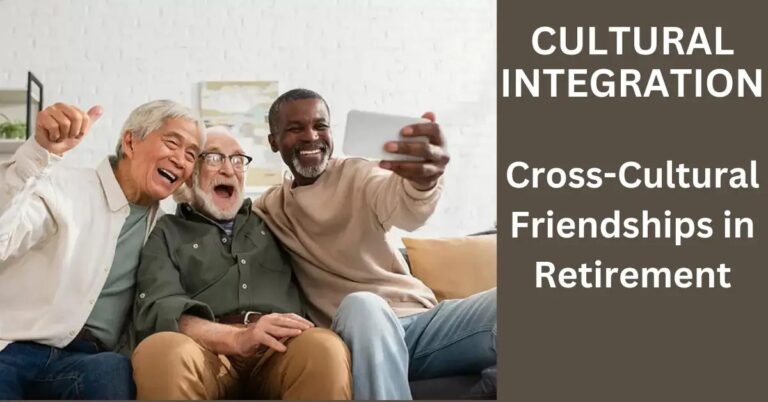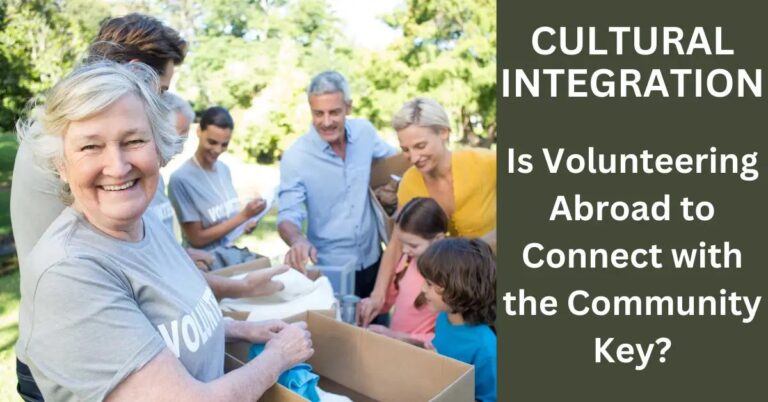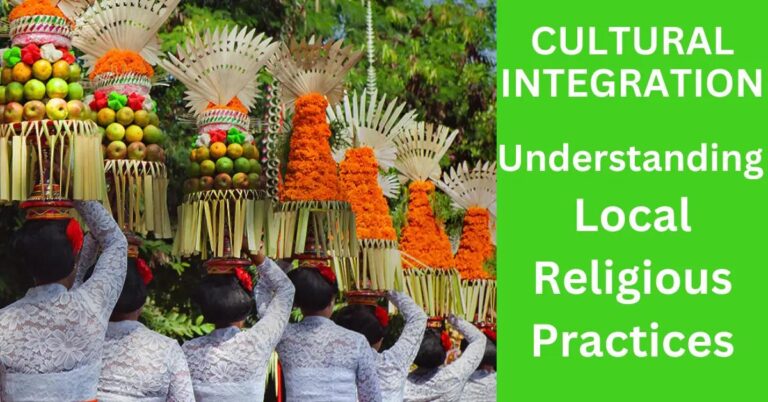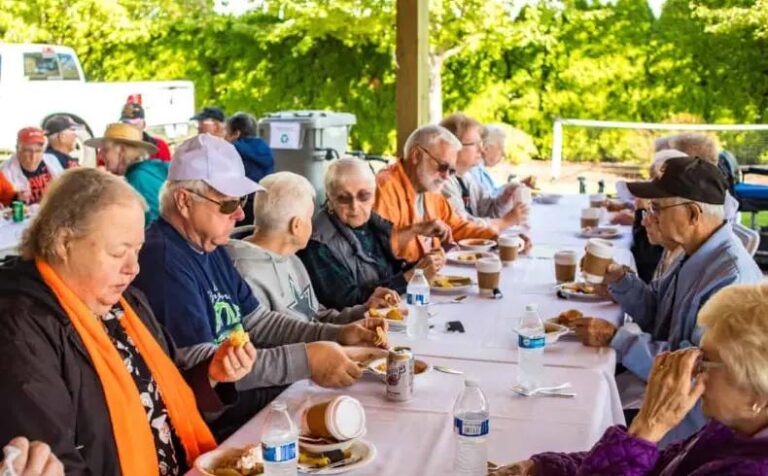TL;DR:
- Research local customs before relocation to respect and integrate smoothly.
- Observe and participate in local behaviors such as greetings and community events.
- Learn basic language phrases to enhance communication and show respect.
- Gradual cultural immersion through food, traditions, and daily interactions builds belonging.
- Understand diverse global retirement customs for richer experiences.
- Manage culture shock with community participation and structure.
- Engage in local groups and events to ease adaptation and combat isolation.
- Joining senior expat groups offers support and connections.
- Cultural exchanges foster mutual understanding and enrich expatriate life.
- Embrace patience and open-mindedness in adapting to new customs when retiring abroad.
Embarking on retirement in a new country can bring excitement and challenges. Embracing local customs as a retiree? That’s a journey worth taking! Trust me, blending into a new culture enriches life like nothing else. We’ll explore researching customs, learning languages, and easing into new traditions. Think of it as an adventure where every step leads to deeper connections and a richer life. Ready to dive in? Let’s go!
How to Adapt to Local Customs as a Retiree?
Adjusting to new customs can feel challenging for retirees. The first step is researching local customs before you move. Why is this so important? Knowing customs helps show respect and avoid misunderstandings. You can read books, explore trusted online resources, or talk with people who’ve lived there. This background knowledge prepares you and sets the tone for honoring local practices.
Observing and learning local behaviors is key. Ever wonder how people greet each other? Pay attention to gestures, greetings, and public behavior. You can start by visiting local markets or attending community events. Watch how people interact and join in where you feel comfortable. It’s like learning a new game by watching before you play. This practical approach helps you integrate better.
Language plays a big role in adapting. But, do you need to speak fluently? Not always. Learning basic phrases shows effort and respect, and it builds good connections. Many retirees find trying to speak the local language is appreciated and opens doors. You could take language classes or use apps to practice. Even small steps help in feeling part of the community.
What about immersing yourself in a new culture gradually? Take your time, explore your new environment, and interact daily. Try new foods, listen to local music, and learn about traditions. Engage in regular conversations with locals to learn deeper meanings behind practices. It’s like learning to swim; you start in shallow waters and gradually get comfortable. This way, you adapt smoothly and enjoy the journey.
Adapting to local customs is a rewarding experience. With patience and curiosity, you’ll find yourself belonging and thriving in your new home.
Understanding Local Traditions
Retirement customs around the world vary widely. In some cultures, retirement signals a time of rest and reflection. Other places see retirees as wise community members who must share their knowledge. Each culture treasures its elder members in unique ways, making adaptation worthwhile.
Consider Japan’s culture. Here, seniors often respect the value of wisdom. Retirement might include offering guidance to younger folks and staying active in meaningful roles. In contrast, Scandinavian countries focus on well-being and leisure. Retirees might spend more time in social activities, enjoying nature, and maintaining health.
Local traditions affect how retirees live each day. For instance, in India, attending vibrant festivals and family gatherings is common. These celebrations create strong social ties and a sense of belonging. In contrast, France prides itself on its café culture. The tradition of spending time in small, local cafes with friends defines social life.
To adapt, understanding these local customs is key. This involves observing how retirees in your new location spend time. Local events, community gatherings, and daily interactions provide insight. You may notice how elders contribute insights or partake in group activities.
Every culture brings opportunities to learn from one another. By embracing new customs, retirees can enrich their experiences. Such adaptation can turn cultural differences into joyful discoveries. Over time, understanding local values can foster a fulfilling retirement overseas.
Learn about different retirement customs globally as you consider retiring abroad. It is an experience enriched by diverse traditions and values. Whether engaging in meals, festivals, or simple greetings, each act deepens connections. Familiarize yourself with these traditions for a warm welcome and a smooth transition.
Embracing New Cultures
Retirement brings big changes, and these can sometimes lead to what some call “retirement syndrome.” It can show up with feelings of being lost or stressed. As a retiree, adapting to local customs can be part of overcoming these feelings. One key thing to watch for is signs of culture shock. This can feel like confusion when you’re trying to fit into a new culture. Knowing this helps you find ways to cope.
Managing culture shock starts with understanding what’s happening. You might feel tired, a bit sad, or even miss home a lot. Recognize these signs early. Talk with others who understand or seek support groups for guidance. Taking small steps in learning traditions helps, too.
Embracing new traditions brings positives. By engaging with local customs, you learn and grow. This builds friendships and creates a sense of belonging. Try joining community events or, if possible, partaking in local festivals. Asking locals about their customs shows respect and interest.
Staying open-minded takes a little effort. Start by accepting differences without judging. It is fine to ask when you’re unsure about something. Remember, patience with yourself is key. Change takes time, and it is alright to move slowly.
Adopting new ways can be a rewarding part of life. You develop knowledge while enjoying your new home. The experiences you gain become invaluable treasures, helping you blend two worlds. Keep a curious heart, and soon you may find a new place that feels like home.
How to Adapt to Local Customs as a Retiree?
Moving overseas after retirement has its ups and downs. One benefit is new adventures. You can explore different lands and meet people with unique stories. Also, your cost of living could be lower, so savings last longer. But living far from family may make you feel lonely. Missing loved ones is hard when special events happen back home.
Comparing life abroad with home can bring surprises. In your new place, you might find friends who share your interests. Life can feel fresh and exciting, with sights and sounds you never knew. But sometimes, you miss things from back home, like certain foods or holiday traditions. It can help to learn from other expats who faced these changes. They often share stories and tips that make life easier.
Day-to-day adaptation brings challenges, too. The simplest tasks, like shopping or using local transport, could feel confusing at first. Each new task may teach you something important about your adopted home. The good news is, you become stronger and more confident with each small win. This growth is key in embracing your Retiree Expat Life.
Understanding local customs helps bridge gaps. Get curious about what locals do daily and why. This respect often opens doors to warmer connections with neighbors. Language learning aids this journey. Knowing a few words shows you care about the culture. It helps when asking for directions or ordering a meal. Body language also speaks volumes; nods and smiles can convey friendliness in any language. Remember, patience and openness make the transition smoother. As you settle in, a new kind of home may emerge, full of new friends and experiences waiting.
Integrating into a Community
When thinking about where to move after retirement, strong communities matter a lot. The right place will help you settle in better. Look for destinations where people are friendly and supportive. These places often have local groups, clubs, and events that welcome new members.
Building meaningful local relationships makes adjusting easier. Starting conversations is the first step. Talk to people in the local market, park, or community hall. Show interest in their stories. Listen to what they share. Learning about others’ lives brings you closer.
Explore community involvement opportunities to make your new place feel like home. Many towns have volunteer groups. Offer your time and skills to help. This keeps you active and gives back to people in need. Try joining clubs that focus on your interests. Book clubs, gardening groups, or walking teams can be great.
Where else can you connect? Libraries host events where people gather. Attend local workshops to learn new skills. These settings bring like-minded folks together. You can make friends while exploring new hobbies at the same time.
Finding community should feel like finding a comfy chair. The fit should be easy, and the people warm. Remember, you’re not just moving to a new location. You’re joining a new family’s embrace. Choose wisely, engage deeply, and give freely. That’s how you truly integrate and feel at home in your new surroundings.
Creating bonds in a new place involves both giving and receiving. As you contribute, you become part of the community’s rhythm. This will enrich your retirement and fill your days with joyful connections and shared smiles. When choosing a destination, community ties matter just as much as the scenery. Be patient and genuine; meaningful connections take time but are well worth the effort.
Learning New Languages for Retirees
Learning the local language is exciting for retirees. It helps bridge cultural gaps. Speaking with locals becomes easier, and it opens doors to new friendships. Imagine understanding jokes or ordering food without pointing at menus.
To start, think of language apps like Duolingo. These are handy for quick lessons. Libraries often have language books too. You might also find classes in community centers. Don’t shy away from trying. Even small steps matter.
Practice is key. Speak with native speakers whenever you can. It feels awkward at first, but it gets better. It’s like riding a bike; you gain speed with effort. Join local conversation groups or language meetups. These groups are great for learning and fun.
What if you struggle with certain words? Use a pocket dictionary or a phone app. These tools work wonders in real-time conversations. Some gestures might also help convey your message.
Language barriers often feel towering, but they shrink over time. You pick up phrases and sounds. Mix the new with what you already know. Slowly, new words begin to stick.
Many retirees find watching local TV shows helpful. You hear the correct accents and common slang. They are windows into everyday conversations. Movies, news, and music add to the experience.
Culture and language connect deeply, and when you learn a new language, you grasp local customs better. It feels like earning a special key that unlocks vibrant stories and traditions. Language lets you explore your new home richly. Stay curious and enjoy the journey.
Building Local Friendships
Making new friends after moving is exciting. Here are some tips that helped me. Smile often and look people in the eye. These small gestures show warmth and interest. Say “hello” or use a local greeting. Practice this in shops or at community events.
Joining social clubs is another great way to meet people. Many communities have clubs just for retirees. These clubs offer activities like gardening, cooking, and book reading. They help you connect with others who share your interests.
Some public places are perfect to make friends as well. Parks, libraries, and cafes often bring people together. Attend events there, such as book readings or local art shows. Conversations happen easily in these relaxed settings.
Local language classes also present excellent opportunities. Many retirees join these classes not just to learn, but to mingle. Becoming friends with classmates is easier when you are all learning together.
You may also want to join senior expat groups. These groups focus on people who have just moved too. Sharing similar experiences bonds you quickly. To find such groups, visit the community center or look online. Expat life can be less daunting when you have these close-knit friends.
These ideas helped me make real and lasting friendships. Every encounter starts with a simple smile. Embrace each opportunity to learn and laugh with locals. Building local friendships can turn a new city into a welcoming home.
Cultural Etiquette for Retirees
Moving after retirement has pros and cons. One challenge is adapting to new cultural norms. Essential etiquette can vary by destination, impacting how retirees feel accepted. Respecting these customs not only helps in social interactions but also enriches the retirement experience. Here, understanding and practicing local manners becomes vital.
Cultural dos and don’ts can be quite specific. For instance, in Japan, it’s polite to remove shoes indoors. In contrast, many Western countries may not stress this. Such differences can affect daily routines. Retirees need to learn what gestures or actions might be considered rude or polite in their new country. Even small nuances, like how to greet someone, require attention. The goal is to show respect and interest in the local way of life.
Maintaining cultural sensitivity is key. It involves paying attention to how people communicate. In some cultures, directness is appreciated; in others, it might seem disrespectful. Retirees should observe how locals react in conversations. This observation helps avoid misunderstandings and builds stronger connections.
It’s helpful to adopt an open mindset. Being curious rather than judgmental allows retirees to learn and adapt more smoothly. Participating in local events provides firsthand experience with customs and traditions. Often, joining community activities can lead to new friendships and a deeper understanding of the culture.
Retirees must navigate the fine line between embracing new customs and retaining their identity. This balance can lead to a richer cultural exchange. Through observing, asking questions, and participating, integration becomes a fulfilling experience rather than a challenge.
For more insights on cultural adaptation, visiting resources like this can provide guidance and community support. It’s important to keep learning and growing, which enhances the joy of retirement abroad.
Respecting Local Traditions
To fit in, learn about local traditions before joining local events. Some places have specific dress codes or ways to greet people. Following these rules shows you care and respect the culture. For example, in some countries, removing shoes before entering a home is standard.
Participating in festivals can be a great way to connect with people. Research each event to understand its meaning first. I find it important to ask locals for advice on what to wear and how to act. This ensures that I show respect and join in meaningfully. You don’t always have to join every activity, but knowing what to avoid can help prevent misunderstandings.
Showing appreciation for cultural heritage means respecting local values and stories. Visit museums, attend local shows, and read books about the history and traditions. These actions demonstrate genuine interest and can start friendly conversations with locals. This curiosity helps preserve traditions and strengthens community ties.
Adapting habits can show respect for local customs. If a place values quiet time in the afternoon, try to avoid loud activities then. Adjusting your schedule or daily habits to fit in can make the transition smoother. Sometimes, small changes in routine make a big difference in feeling welcome.
By following these tips, you can integrate smoothly and build strong relationships. Engaging with local traditions enriches your life and provides a sense of belonging in your new home. Cultural understanding enhances the experience of living abroad and adds a layer of richness to the tapestry of life as a retiree.
Adapting to Foreign Customs
One pitfall of relocating after retirement? Culture shock. It happens from not knowing local habits. This can disorient and isolate you. To adapt, begin with understanding cultural barriers. Each place has its own norms. Some gestures may mean different things. Research is key here. Books and online guides help uncover local practices. Museums and cultural centers offer insights too.
Learning new societal norms takes time. Start simple. Observe how locals greet each other. Notice what they wear. Also, understand dining norms. In some cultures, eating with hands is normal. Others use chopsticks or noisemaking as a compliment. Respect these practices to avoid misunderstandings. Try adopting local meal times which fosters connection.
Embrace cultural diversity by engaging with the community. Attend local events. Festivals are perfect. They open you to traditions and people. Volunteer for community projects; it builds bonds and trust. You gain new skills and friends.
Another method is to join local expat groups. They offer valuable resources and advice. Members share experiences and tips on blending in. Listen to their stories. These stories help in navigating challenges. Some regions have seniors’ clubs tailored for retirees. They host activities suiting all interests.
Language learning is another hurdle yet rewarding. Speaking the local language eases adaptation. Basic phrases become lifelines in daily tasks. Language schools or apps can assist. Practicing with locals is fun and effective. It shows respect and willingness to engage.
Adaptation requires patience and an open mind. Cultural understanding develops over time. Be kind to yourself during the transition. You will make mistakes. Apologizing and showing interest will mend any cultural faux pas. Each step taken brings you closer to being a part of the community. It’s a journey of learning and growth. Enjoy the beautiful experience of embracing diversity.
Cross-Cultural Understanding
Developing cultural empathy is key for retirement in new lands. This empathy helps us see our new home through the eyes of locals. It’s like putting on someone else’s shoes to walk a mile. Understanding these cultural differences enriches our lives.
Cross-cultural exchange and dialogue offer great benefits. When we share our stories and listen, new friendships form. It deepens respect and appreciation for diverse traditions. Dialogue is a bridge that connects people across cultures.
To enhance cultural awareness, consider a few tools. Reading books about your new country offers insight into its history and customs. Joining local clubs and groups immerses you in the culture. Online forums also provide a platform to interact with locals and learn from their views.
Participatory activities, such as cooking classes or art workshops, enhance understanding. They allow us to engage with local practices in a hands-on way. It’s important to step out of our comfort zone and explore. This exploration increases our knowledge and appreciation for the community around us.
Cultural empathy is about thoughtful observation and open-minded listening. It requires patience and a desire to learn. Approach new encounters with humility and respect. Practice active listening during conversations and ask questions to further your understanding.
These steps open doors to meaningful relationships, foster deep respect, and enrich your new life abroad. When we appreciate our differences, our hearts and minds grow. This growth leads to a richer, fuller experience as a retiree in a foreign land. Cultural understanding transforms challenges into opportunities for growth.
By developing empathy, engaging meaningfully, and utilizing practical tools, retirees can not only adapt but thrive in their new cultural settings. Every interaction becomes a chance to learn and grow, encouraging a seamless integration into the local community.
Overcoming Culture Shock
Adjusting to retirement is a big change. It can take months or even years to feel settled. Emotional ups and downs are normal. You might feel lost or unsure about your new life. This is part of culture shock. It’s like learning everything anew—food, manners, even daily routines.
Feeling homesick in a new place is common. It can hit without warning. Remember, you are not alone in this journey. Many retirees face similar feelings. I met a retiree, Jim, who moved from New York to Spain. He struggled at first but learned to embrace this challenge.
Jim shared his story with me. He started joining local clubs. This helped him find friends and learn more about his new home. So, dive into community events. Find clubs that match your interests.
Create a daily routine to bring structure to your day. Plan simple things like morning walks in the neighborhood. This helps you connect with your surroundings. Cooking local dishes at home is also a good idea. This can break down cultural barriers and make you feel more at ease.
Talk to other retirees who settled before you did. They beat culture shock by sharing their stories. They understand the feelings you’re facing and offer tips that worked for them. Many recommend keeping an open mind. This means accepting that every new place has its own unique culture.
Every day gets easier if you stay engaged. Stay curious about the people around you. Embrace this exciting time in your life. You are embarking on a grand adventure, full of new experiences and opportunities. Enjoy these years of exploration and growth to their fullest.
Engaging in Local Events
To adapt to local customs as a retiree, start with local events. Look for community boards or local papers to spot exciting activities. Social clubs or libraries often display event flyers. If online, search community websites or social media pages. These resources provide a calendar of local happenings. Discovering events can immerse you quickly into the rhythm of community life.
When you find an event or activity that interests you, join in. Begin by attending a local fair or a neighborhood picnic. These events are welcoming and full of joy. You might meet neighbors who share your interests. When you participate, show genuine curiosity. Talk with people, ask about the event, and learn some history. Interaction like this can cement your place in the community.
Participating in community celebrations enriches your understanding of the culture. Each festival sheds light on local traditions, beliefs, and values. For example, parades often showcase regional costumes and dances. Food festivals allow you to try traditional dishes. Such experiences deepen your connection to the place.
Engaging socially at cultural events offers many benefits. You create new friendships with locals and other expats alike. Conversations might spark ongoing relationships. This expands your social circle and makes you feel part of the community.
Engagement also helps overcome feelings of isolation. By joining events, you actively choose to step out of your comfort zone. Steady participation can transform you from a spectator to an insider. Over time, you’ll find local customs more familiar.
Combining discovery and active participation can ease your transition into retirement. Embrace your new surroundings and enrich your life’s chapter by actively partaking in what local culture offers. Engaging in events ensures a fulfilling expatriate experience full of learning and joy.
Senior Expat Groups
Senior expat groups play a huge role in helping retirees settle in new lands. These groups offer a safe space to meet people with similar experiences. They can guide you through local customs and offer friendly faces when you’re far from home. One of the major benefits of joining a senior expat group is the instant network of friends.
If you’re wondering about resources to find such groups, your best bet is online research. Websites like InterNations and local social networks can help you find groups near you. Once you find a group, reach out and attend a meeting. This way, you will feel welcomed and supported during your transition.
Now, let’s address the social and support benefits offered by these groups. The feeling of loneliness can strike when you’re in a new country. When you join a senior expat community, you gain access to people who understand your struggles. They will offer practical help, from recommending local shops to sharing advice on navigating culture differences.
Moving after retirement has its pros and cons. The biggest pro is the fresh start somewhere new. Enjoy new experiences, sights, and sounds outside your comfort zone. But, the cons include adjusting to new norms and finding ways to fit in. Senior expat groups cushion that adjustment. Having a community makes it less daunting to face these challenges.
Another useful aspect of these groups is social activities and gatherings they organize. Whether they’re monthly dinners, book clubs, or holiday events, these activities build bonds. It’s not only about making friends but feeling a sense of belonging. Embracing local customs becomes easier with friends who are on the same journey.
Incorporating these tips into your life will make settling into a new country more enjoyable.
Retiree Cultural Exchange
Sharing my culture with locals opens doors to rich experiences. Every place has stories, traditions, and foods different from what you know. When I share my own customs, it breaks down invisible walls. Locals appreciate and respect this exchange, enriching both our lives.
I discovered cultural exchange programs designed for retirees. These programs facilitate interactions between diverse cultures. They create events where retirees like me showcase our skills—cooking, arts, or even folklore tales. Such events promote understanding. I learn about others while they learn about me.
Why is cultural exchange important? Because it builds connections. When I engage with locals through their food, festivals, or history, it creates respect. Not just respect—it nurtures friendships. These mutual exchanges foster an environment where everyone learns to value differences.
Imagine joining a pottery class in a new country. As you mold clay, a local retiree next to you does the same. You share stories, laugh, and learn each other’s techniques. That exchange enriches the class. It illustrates how retirees can adapt by embracing local customs together.
Through these shared moments, there are benefits. First, cultural learning nurtures personal growth. It expands understanding of the world. Second, it reduces feelings of isolation. When retirees engage in mutual learning, they feel less alienated. Third, it fosters community. It creates bonds that help adapt more comfortably to a new location.
I found that local schools or community centers provide these exchange opportunities. Volunteering can offer similar experiences as you share and learn new traditions. Retirees should seek these chances for cultural dialogue. They offer priceless knowledge and foster harmony between diverse cultures.
The essence of adapting lies in these exchanges. Step by step, retirees become part of the vibrant tapestry of a new community. Engaging, learning, and sharing customs are key to a fulfilling expatriate experience.
Conclusion
Living abroad after retirement opens a world full of exciting challenges. Research local customs before you move to enjoy a smoother transition. Learning the local language speeds up cultural adaptation. Engage with local events and communities to build lasting friendships. Understanding and respecting local traditions enriches your experience and fosters cross-cultural connections. Reflect on the benefits and challenges of this journey, and remember to stay open-minded. By embracing new cultures and growing your network, you can make your expatriate life both rewarding and fulfilling.

